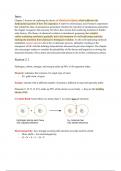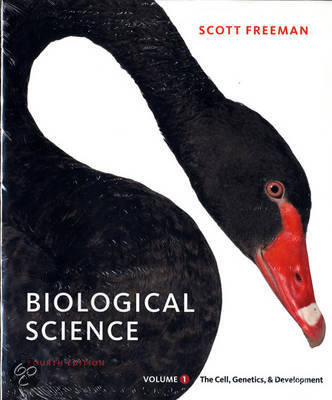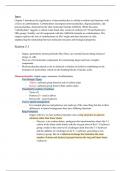BIOL 1306 (BIOL1306)
University Of Houston - Main Campus
All 5 results
Sort by


-
Biology Chapter 2 Notes
- Lecture notes • 6 pages • 2023
-
scarlettrich
-
- $8.49
- + learn more
Chapter 2 focuses on exploring the theory of chemical evolution, which addresses the fundamental question of how life originated. It starts by referencing Louis Pasteur's experiment that refuted the idea of spontaneous generation. Despite the rejection of spontaneous generation, the chapter recognizes the necessity for life to have arisen from nonliving materials in Earth's early history. The theory of chemical evolution is introduced, proposing that complex carbon-containing substances gradua...


-
Biology Chapter 5 Notes
- Lecture notes • 5 pages • 2023
- Available in package deal
-
scarlettrich
-
- $7.99
- + learn more
Chapter 5 introduces the significance of macromolecules in cellular evolution and function, with a focus on carbohydrates. Carbohydrates encompass monosaccharides, oligosaccharides, and polysaccharides, characterized by their molecular formula (CH2O)n. While the name "carbohydrate" suggests a carbon-water bond, they consist of carbonyl (C=O) and hydroxyl (-OH) groups. Notably, not all compounds with the CnH2nOn formula are carbohydrates. The chapter explores the role of carbohydrates in life'...


-
Biology Chapter 6 Notes
- Lecture notes • 2 pages • 2023
- Available in package deal
-
scarlettrich
-
- $7.99
- + learn more
Chapter 6 explores the significance of membranes in biological evolution and cellular life. It begins by discussing the hypothesis that biological evolution originated from self-replicating molecules enclosed within membranes. These membranes, particularly the plasma membrane, act as selective barriers, separating life from nonlife and regulating the passage of substances. Their role in concentrating reactants within cells promotes efficient chemical reactions. The chapter dives into the formati...


-
Biology Chapter 4 Notes
- Lecture notes • 6 pages • 2023
- Available in package deal
-
scarlettrich
-
- $7.99
- + learn more
Chapter 4 delves into the origins of life, highlighting the RNA world hypothesis as a leading contender for life's beginnings. It explores the debates surrounding the first "living molecule," whether RNA was the initial player, and how self-replicating molecules led to biological evolution. The chapter also discusses nucleic acids' structure, function in modern cells, and their role in triggering life's evolution on Earth. It starts with an examination of nucleic acid monomers and their polymeri...


-
Biology Chapter 3 Notes
- Lecture notes • 4 pages • 2023
- Available in package deal
-
scarlettrich
-
- $7.99
- + learn more
Chapters 3 to 6 explore the molecule responsible for life's origin. Early experiments, including Stanley Miller's, produced amino acids, the building blocks of proteins. Amino acids have been found in meteorites and in interstellar-like conditions. This raises the question: Could proteins, made of amino acids, have sparked life? For this, proteins must possess life's key attributes: information, replication, and evolution. We start by understanding amino acids, proteins' basic units, and how t...

£5.50 for your revision notes multiplied by 100 fellow students... Do the math: that's a lot of money! Don't be a thief of your own wallet and start uploading yours now. Discover all about earning on Stuvia


